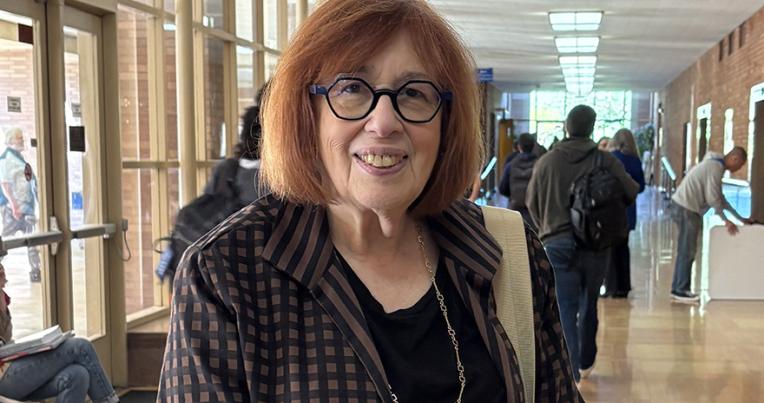Legal Pathways Beyond Dobbs
On March 6-7, UCLA Law’s Center on Reproductive Health, Law, and Policy, in partnership with Yale Law School and Temple Law School, convened legal scholars and experts for a series of discussions on rebuilding constitutional foundations for equality and reproductive rights and justice post-Dobbs.
Participants explored and debated theories and strategies to advance reproductive and sex equality rights grounded in constitutional and doctrinal principles, fresh historical analysis, and novel legal arguments.
Scholarly Essays on Legal Pathways
In connection with the convening, eleven scholars contributed thought-provoking essays for a Balkinization Symposium on Legal Pathways Beyond Dobbs (April 10, 2025).
Professors Cary Franklin and Mary Ziegler, make powerful cases for further interrogating and resisting the Court’s history-and-tradition approach in Dobbs and other recent cases. As Ziegler argues, relying on history and tradition allows conservative movement leaders and their allies in the judiciary “to speak through past actors to whom they claim to defer . . . to conceal the policy choices they face in critical areas” where they lack support, including criminal abortion bans, interpretation of the Comstock Act and fabrication of “fetal rights.” And, as Franklin proposes, because “too many regulatory traditions violate contemporary understandings of equality for courts to adhere consistently to the results of the history-and-tradition test,” there may be “contexts in which the Court is less willing to disregard concerns about sex equality and basic rights to life and health.” Offering a different tack, Professor Michael C. Dorf encourages progressives to pursue “ideological jujitsu” and “evade the history-and-tradition test” altogether by building out claims to reproductive and sexual freedom grounded in enumerated rights. And with vivid analogy to the fictional monster Cthulhu (imagined by notoriously xenophobic novelist H.P. Lovecraft), Professor Evan D. Bernick argues that modern attacks on reproductive rights and birthright citizenship, like prior incarnations of similar “[m]onstrous institutions and ideas,” such as the Fugitive Slave Act, Chinese Exclusion Act and Comstock Act, can be, and have been, thwarted through a combination of legal and community-based resistance strategies.
Several scholars offer compelling arguments, and cautionary notes, for theorizing ways that equality doctrine or values can vindicate rights related to reproduction, bodily autonomy, gender identity, and family formation. Professor Jessie Hill argues grounding abortion rights in a “right to equality in health care, or a right to health care nondiscrimination,” while recognizing this “equality lens” also “requires dismantling the elective-therapeutic distinction regarding abortion” as itself a product of sexism. Professor Laura Portuondo, observing that the “Supreme Court has extended a broad new vision of equality to religious conservatives,” through recent free exercise decisions, proposes a strategy of extending this First Amendment “anti-devaluation theory of equality” to achieve reproductive justice ends. Meanwhile, Professor Cahill exposes how Dobbs’s revisionist use of “footnote twenty from Geduldig, which held that pregnancy discrimination wasn’t sex discrimination” is an example of “precedent manufactured in real time – and therefore, by definition, not a precedent at all – that lacks grounding in text, history, and actual precedent.” And Professor Douglas NeJaime calls out the need to more “clearly name” how legal appeals to biological or “natural” parenthood hide animus and “smuggle in arguments that rely on sex-based stereotypes” to harm LGBTQ families and women alike. More skeptically, tracing the Court’s methodological inconsistency in case after case, Professor Neil S. Siegel cautions that in the current political moment, it is unlikely the Court will adhere to its interpretive commitments when it comes to equality rights for disfavored groups, particularly transgender people.
Finally, responding to the rise of “fetal personhood” arguments in law and public narratives, Professors Kimberly Mutcherson and Meghan Boone urge autonomy and equality responses to these efforts to erase the personhood of pregnant people. Mutcherson argues that those who would legally “subordinate pregnant women to the nascent lives they carry” cannot offer a secular account for this deprivation of bodily integrity and Boone urges advocates to call this out for what it is – “arguments against women’s equality.”
Collectively, these essays offer multiple pathways for advancing reproductive and sex equality rights under law, with special attention to the Court’s history-and-tradition approach, the realities and challenges of our modern judiciary, and the need for liberty, autonomy, equality, and health rights that redress the related threats to reproductive, racial, and economic justice.
Read the essays in full:
- History & Tradition’s Equality Problem, Cary Franklin
- The History & Tradition of Criminalization, Mary Ziegler
- Enumerating a Post-Dobbs Pathway, Michael C. Dorf
- Cthulhu and the Constitution, Evan D. Bernick
- Abortion Rights as Health Care Rights as Equality Rights, B. Jessie Hill
- Anti-Devaluation as Reproductive Justice, Laura Portuondo
- The Other Footnote, Courtney Cahill
- Biological Parenthood and Inequality, Douglas NeJaime
- The Fate of Bostock’s Formalism After $215 Million Spent on Anti-Trans Ads, Neil Siegel
- The Shared DNA of Roe and Dobbs: Potential Life as a Tool of Subordination, Kimberly Mutcherson
- The Question of Female Personhood, Meghan Boone
